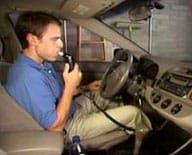 One of the mandates for Mothers Against Drunk Driving (MADD) is to stop repeat drunk drivers from re-offending, and ignition interlock systems are a big part of that. They are the only device that can stop a driver from starting their vehicle if they’ve been drinking, and they’ve been found to reduce the likelihood that a drunk driver will re-offend by up to 67%.
One of the mandates for Mothers Against Drunk Driving (MADD) is to stop repeat drunk drivers from re-offending, and ignition interlock systems are a big part of that. They are the only device that can stop a driver from starting their vehicle if they’ve been drinking, and they’ve been found to reduce the likelihood that a drunk driver will re-offend by up to 67%.
We know that more states are changing their driving under the influence laws to require ignition interlock devices for first time and repeat offenders, and we know that ignition interlocks work, so how are some of these offenders still getting behind the wheel and re-offending?
Judging from headlines in the news recently, it appears as though some offenders are tampering with their ignition interlock devices. A man in Benton, Arkansas was stopped and arrested recently for suspicion of driving while intoxicated (DWI) when he was heading the wrong way down a street. Police found he somehow bypassed his court ordered ignition interlock system, and his many charges included DWI-4th offense, Drinking on the Highway, and Tampering with an Ignition Interlock Device.
When a woman in New York State wanted to drive after drinking, she asked a friend to blow into her interlock device to start the vehicle. Because ignition interlock systems will require a rolling retest while the car is in motion, he also blew into the device to keep it going while she was driving. She’s been charged and will answer to charges in court.
These two are just a few recent examples of people attempting to get out of serving their interlock penalty, but what they’ve now discovered and what others who may be considering bypassing their interlock device should know is that cheating, tampering, or asking a friend to bypass your interlock is a really bad idea.
If you’re caught bypassing or cheating your ignition interlock system, you could be charged with more severe penalties and may lose the privilege of having a restricted driver’s license. You could also be asked to use the device for an even longer term than your original ignition interlock program required.
Ignition interlock systems are part of MADD’s fight against drunk driving because they are the most effective way of stopping drunk drivers. In the heat of the moment, offenders who cheat the ignition interlock system might think they have something to gain, but they can’t bypass the penalties waiting for them if they do.